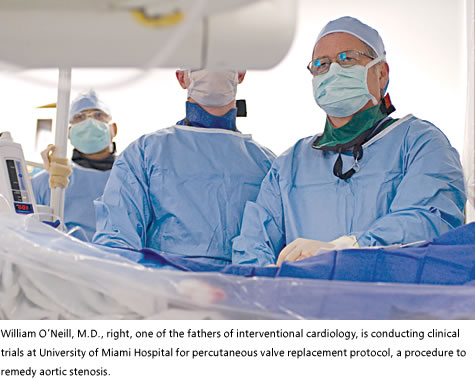recruits and clinical trials reflect growth
Building a Cardiovascular Powerhouse
growth of the Miller School’s Cardiovascular Division has recently been accelerated by the addition of several new recruits. Gervasio Antonio (Tony) Lamas, M.D., took over as medical director of the Coronary Care Unit at University of Miami Hospital on June 2, and Vivek Y. Reddy, M.D., will begin as director of the electrophysiology unit in July.

“UM’s cardiology program is on track to become one of the best in the country,” says Lamas, an expert in the design and execution of clinical trials who joined UM after 15 years at Mount Sinai Medical Center in Miami Beach. He will continue his private practice at University of Miami Hospital.
Reddy, who comes to Miami from Massachusetts General Hospital, says he plans to “build a world-class cardiovascular center specializing in heart rhythm disorders.” He brings with him a team of top electrophysiology experts.
The two physicians are joining a division where doctors are already in the national spotlight for ongoing work, including two revolutionary procedures: a percutaneous valve replacement performed using catheters, and the continuation of a cutting-edge series of clinical trials researching the use of stem cells to treat heart failure whereby mesenchymal stem cells, or a placebo, are injected directly into the patient’s heart following bypass surgery. The stem cells are taken from the patient’s bone marrow and cultured at a UM laboratory.
Percutaneous valve replacement is a new option for some older people who suffer from aortic stenosis but would not normally be treatable because they would be unable to withstand open-heart surgery and a long recovery period. The disease, a narrowing of the valve that restricts blood flow, is a function of aging and has a high mortality rate if not treatable.
The new procedure, an FDA-approved clinical trial that is available at a handful of select facilities across the nation and only at UM in Florida, launches a “new era in the management of heart disease,” says William O’Neill, M.D., executive dean for clinical affairs, who, along with Alan Heldman, M.D., clinical chief of the Cardiovascular Division, implanted the new heart valves. “Patients with complex problems no longer need to leave Florida to get to the best doctors,” says Heldman.
Joshua M. Hare, M.D., chief of the Cardiovascular Division and director of the Interdisciplinary Stem Cell Institute, is leading the stem cell studies, which are the first funded by the National Institutes of Health Specialized Centers for Cell-Based Therapy.
“The implications for this kind of therapy are enormous when you consider that nearly five million Americans suffer from heart failure, and 500,000 new cases are diagnosed each year,” says Hare. “We are very optimistic because we have experimental data that show very clearly the cells we are using do have the ability to turn into new heart muscle cells.”